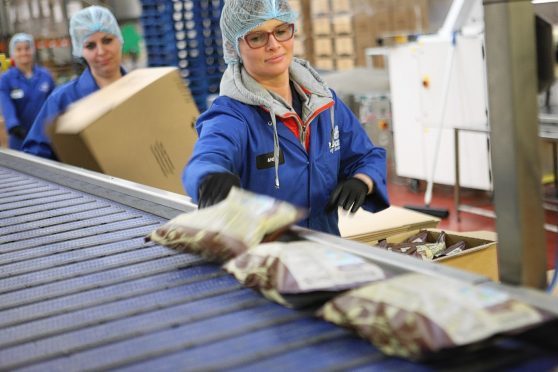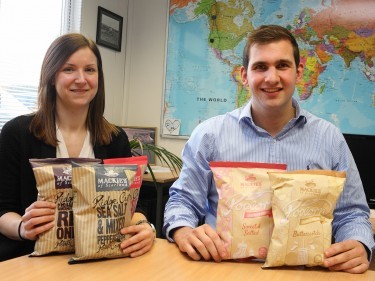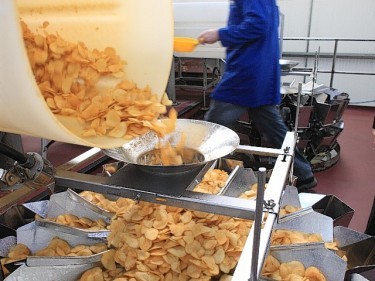The mouthwatering smell of fried potatoes meets you as you approach Mackie’s at Taypack.
And the feast for the senses continues as you enter the factory, where all sorts of flavours of crisps are being packed for shipment all over the world.
The firm, which is based at Errol in Perthshire, is Scotland’s only manufacturer of crisps, holding around 15% of the market share for the snacks in Scotland.
Launched in 2009, the firm is a joint venture between two well-known Scottish farming families – the Mackies who produce Mackie’s of Scotland ice cream at Westertown, Rothienorman, Inverurie, and the Taylor family who previously ran potato packing company Taypack in Inchture, Perthshire.
Commercial director James Taylor said the company, which employs 52 people, is on track to reach a £6million turnover this year having achieved a steady 20-30% business growth every year since it formed.
Its range of crisps, which come in 16 different varieties, is stocked in major supermarkets, independent shops and the food service sector.
“Dad had always wanted to get into the crisp side of things but he had been too busy with the potato packing,” said James, whose father George is the company’s managing director. “It was only when we sold the packhouse that he got into it. There was no other premium crisp brand out there. The Mackie family read this in the paper and to prevent going into business with one another unnecessarily they decided to launch the crisps under the Mackie’s brand.”
The joint venture was originally an equal 50:50 split, however in 2013 the Taylor family became the main partner holding 75% of the company.
The firm’s global brand manager, Rebecca Russell, said: “We still work very closely with Mackie’s of Scotland. They are still part of the brand and the story, but we are also trying to tell the Taylor family story as well.”
All potatoes for the crisps are sourced from growers in the Scottish Borders and the north of England, with the company estimating it will need 6,500tonnes of raw material to meet demand over the next 12 months. This is likely to produce around 12million bags of crisps.
Three different varieties are used in the production process – Lady Claire, Lady Rosetta and Taurus – with each crisp packet stating the variety used for that particular batch.
According to Ms Russell, the production process at Mackie’s at Taypack is quite unique for the premium crisps market because everything is made in a continuous process rather than in separate batches.
“We feel it helps retain the taste of the potato in the crisp and it gives them a different texture,” she said.
“It’s a different crunch – it’s more of a biscuit crunch.”
The firm’s general manager, Stephen Urquhart, said the production process had been streamlined in the past 12 months to make better use of the facilities on-site.
Part of this streamlining process has been the appointment of nine new members of staff in a bid to reduce the reliance on agency staff, as well as a move to have one main production line instead of three. The living wage has also been introduced.
Explaining the production process, Mr Urquhart, said potatoes are washed and graded when they arrive on site before being sent to get chopped.
The potatoes are then blanched in water at about 50 degrees Celsius to start the cooking process before being dried and put through a frier with high olaic sunflower oil for 6-8 minutes at between 150 and 165 degrees Celsius. Any defect crisps – those which are burnt or stuck together – are then removed and the remaining crisps are covered with seasoning and packaged into either 150g or 40g bags.
The seasoning, which flavours the crisps, is applied when the crisps are hot so that it sticks to them.
Filled bags are then checked for defects before being packed into boxes and packaged up ready for delivery.
Mr Urquhart said testing is done by the firm’s quality assurance team throughout the production process to ensure a high-quality product is made.
Potatoes from each load are put through the production line and tested before a full run is carried out and a handful of completed bags from each production run is stored for 12 months for traceability.
It’s not just British shoppers who are munching away on Mackie’s crisps; the company has been exporting since 2010 with its product now reaching 17 countries across the world.
Ms Russell said: “The biggest export market is China, followed by Singapore and Malaysia and Canada. Exports make up 15% of sales.”
The firm also recently launched a range of popcorn, which is currently stocked in Sainsbury’s and Scotmid.
The range is currently made off-site but if it proves successful, a new popcorn-making facility will be added to the Errol site and production will be brought back in-house.
“Popcorn has grown ridiculously fast (in popularity) in the past couple of years and it’s starting to take away space in the crisps aisle,” said Ms Russell.
“The crisps market as a whole is in decline, albeit premium crisps are in growth, and so popcorn is an opportunity for us to offer our customers a healthier alternative and to tap into new markets.”


